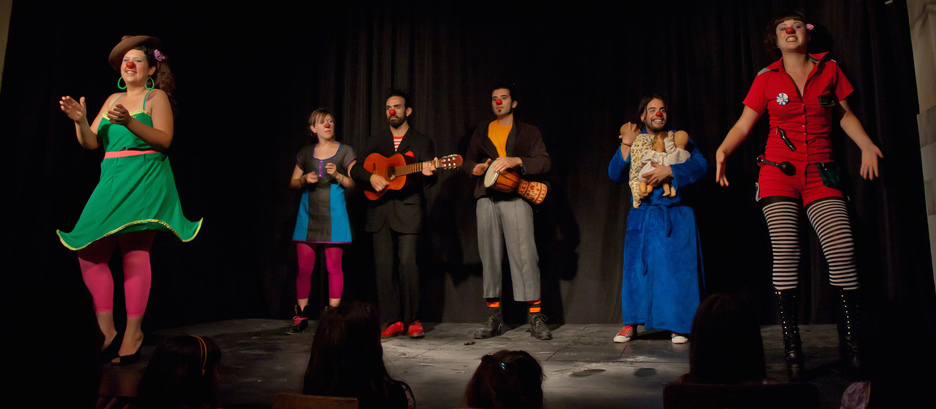 The words “be vulnerable” are now becoming mainstream, thanks, in part, to Brené Brown. In her brilliant TEDx talk, she talked about vulnerability while demonstrating being vulnerable. I assigned it as required viewing to my leadership classes.
The words “be vulnerable” are now becoming mainstream, thanks, in part, to Brené Brown. In her brilliant TEDx talk, she talked about vulnerability while demonstrating being vulnerable. I assigned it as required viewing to my leadership classes.
But even as many of us acknowledge the power of vulnerability, being able to stand tall and be vulnerable still requires practice.
I recommend clown school.
For those of us who were rewarded, as professionals, for being smart, abstract thinkers, astute reflectors and conceptual problem solvers, clown school can come as a big shock. None of that will help you there.
Yet a clown class or clown school can offer big insights, even to those of us who may never want to step foot on stage or clown professionally. Here are some of mine:
Embracing failing
Clown school is where you get to practice failing in public, again, and again and again.
Now in management, we sugar-coat the word failure with expressions like: “You didn’t really fail” or “It was a great learning experience.”
Not in clown school.
In clown school, you stand in front of an audience and try to make them laugh. And when they don’t laugh you flop. There’s no wimpy, middle ground.
You stand open and exposed as you acknowledge your failure. And decide what the heck you’re going to do next.
Clowning is about looking failure straight in the eye.
“Look at your audience,” Aitor Basauri, a Spanish clown who directed my recent workshop, would yell at me. “Look at their eyes. Can you see that you’re flopping?”
Holy Moly! I don’t need to see their eyes to know that I bombed – like duh, there was no laughter. And the LAST thing in the world I wanted to do when I flopped (which was most of the time) was LOOK into someone’s eyes. And watch them acknowledge my flop.
(I still need to take a class in remedial-failing.)
Laughing like there’s no tomorrow
When do you get to really laugh these days? Not the polite chuckle at a friend’s joke, but the side splitting, hold on to your pants and try not to pee (TMI) laughter?
Clowns make people laugh, and watching people try to clown – in their inimicable ways – can be hilarious.
A five-day immersion into clown laughter is a trip out of your head, into your belly, where you can discover parts of yourself you rarely, if ever, experience in your day-to-day job.
Developing your survival skills
Standing raw before people, especially when you’re flopping, isn’t easy.
Of course, most of the time when you’re on stage – especially in a class – your audience secretly likes you (good to know if you’d ever believe it). They just don’t like what you’re doing.
This provides a big incentive to work on your self-worth. As much as you want the audience to like you, it’s your sense of self-worth, curiosity, and play that will carry the day.
Getting to be stupid.
The clown lives in a universe ruled by its own perverse logic – where the clown’s decisions don’t make sense to normal people. It’s what makes her fun.
But she’s never dumb. So trying to be dumb is dumb.
Because you’ve got to be smart to be as stupid as a clown.
As Aitor reminded us, we don’t laugh at dumb people who are really dumb or handicapped (like folks with autism or Tourette’s.) Laughing at people who don’t have a choice is just cruel.
An audience needs to know that you’re actually smart – it’s just that you’re also stupid and never seem to get things right.
It’s so freeing to expose our inner stupid, which believe me, we all have.
Enjoying being physical
Now, I was a bit older than most of the students and the games and warm-ups to loosen up one’s clown muscles took a LOT of stamina. My ankles wobbled, my thighs throbbed, and I tried to mask my loud huffing and puffing while we played super vigorous games.
I wasn’t going to let my age take me out, though, when I could play with really funny, buff, gorgeous, twenty year old actors who ran about wildly, leaped in the air, bopped each other, and periodically exploded into pools of sweaty virile energy.
(To my women friends, doesn’t this make you want to sign-up? Because forget what your mother said – when you’re older, you get to stare.)
Being real
The big reason all leaders should go to clown school, is that clowning requires you to be unflinchingly real with people.
On the second day, Aitor forbade me to smile. Hey, I’m a nice girl. I smile. Even when I’m standing in front of people wanting to die.
Or melt into a puddle of tears.
Being real is the first step to making people laugh.
Aitor says:
“Your clown is the thing that your good friends say about you behind your back.”
Notice that he said good friends. The ones who really like you and know your weirdnesses, your quirks, and your personality. They can laugh about you because they love you.
I left the class devastated, knowing that there were still layers of my personal masks I needed to drop.
But I also felt bolder and more real.
So if you’d like to practice being vulnerable and take being real to the next level, clowning’s the ticket.
It will give you more freedom to be your magnificent you.









